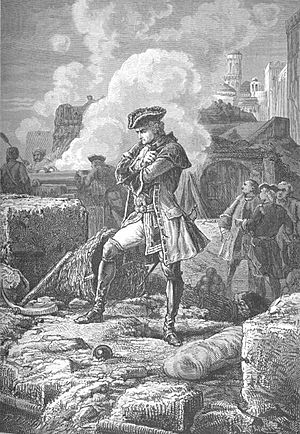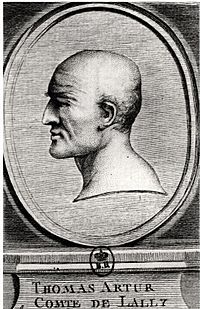Thomas Arthur, comte de Lally facts for kids

Thomas Arthur, Count of Lally, Baron of Tollendal (born January 13, 1702 – died May 9, 1766) was a French general. His family came from Ireland and supported the Jacobite cause.
Lally led French soldiers in India during the Seven Years' War. This war involved many countries fighting around the world. He tried to capture Madras, a key city, but failed. Later, he lost the Battle of Wandiwash to British forces. He then had to surrender the French base at Pondicherry.
After being a prisoner of war in Britain, Lally chose to return to France. He wanted to face charges about his actions in India. Sadly, he was sentenced to death and beheaded. Many believed he was blamed unfairly. Other officers' jealousy and a lack of supplies made his job very hard. Years later, in 1778, King Louis XVI officially cleared his name.
Contents
Early Life and Military Career
Thomas Arthur was born in Romans-sur-Isère, France. His father, Sir Gerald Lally, was an Irish Jacobite from Tuam, Ireland. His mother was a French noblewoman. The family name "Lally" comes from their old home, Castel Tullendally, in Ireland.
He joined the French army in 1721. He fought in a war against Austria in 1734. Lally was also at the Battle of Dettingen in 1743. He commanded his own "Regiment de Lally" in the famous Irish Brigade. This group fought bravely at the Battle of Fontenoy in May 1745. After this battle, King Louis XV made him a brigadier.
Lally strongly supported the Jacobites. In 1745, he went with Charles Edward Stuart (also known as Bonnie Prince Charlie) to Scotland. He served as an aide-de-camp (a personal assistant to a high-ranking officer) at the Battle of Falkirk in January 1746. He escaped back to France and served with Marshal Saxe. He was made a maréchal de camp (a type of general) after the capture of Maastricht in 1748.
Leading French Forces in India
When war with Britain started again in 1756, Lally was chosen to lead French India. He took four battalions of soldiers to India. Two of these were from his own Irish Brigade. He arrived in Pondicherry in April 1758. Within six weeks, he had pushed the British back from the coast. He reached Madras, which was the main base for the English East India Company.
Lally was a brave and skilled general. However, he had a very strong personality. This sometimes made him unpopular with his officers and soldiers. He failed in an attack on Tanjore. He also had to leave the Siege of Madras (1758) when the British navy arrived. This was because he did not have enough French naval support.
In 1760, he was defeated by Sir Eyre Coote at the Battle of Wandiwash. Lally was then surrounded in Pondicherry. He was forced to give up the city in 1761.
Unfair Trial and Clearing His Name
After his defeat, Lally was sent to England as a prisoner of war. In France, many people blamed him for the loss to the British. They wanted him to be put on trial. While in London, Lally heard he was accused of treason in France. He decided to return to France to face these charges, even though he was advised not to.
He was held prisoner for almost two years before his trial began in 1764. During the trial, Lally was not given the documents about the charges. He was also not allowed to have a lawyer to defend him. The trial lasted for two years. On May 6, 1766, he was found guilty and sentenced to be beheaded.
Lally was taken to the Place de Grève for his execution. It was a very sad and unfair end for him. The charge of treason was not true. However, he had made many enemies among the officers and leaders in the colony. They felt safer if he was found guilty.
Lally had a son, Trophime-Gérard. This son later became a famous French statesman. He spent much of his life trying to clear his father's name.
Voltaire's Help
The famous French writer Voltaire knew Lally. Voltaire did not like Lally's personality. But when he heard about Lally's execution, he was surprised. He wrote that Lally might have been difficult, but he did not believe Lally was a traitor.
Voltaire had worked to fix other unfair court cases. He wanted to help Lally, but it was hard to get the court documents. In 1770, Lally's son, Gérard, asked Voltaire for help. The campaign to get the court records was very slow.
When Louis XVI became king in 1774, there was more hope for justice. After many discussions, the Royal Council agreed in 1778 to cancel the original trial against Lally. The case then went to another court to be officially overturned.
On May 24, 1778, just before he died, Voltaire learned that Gérard de Lally-Tollendal could appeal the case. Voltaire was very happy. He wrote his last letter, saying he was content knowing the king was defending justice. The sentence was finally overturned in 1781. However, the original conviction itself was never fully cleared.
See also
 | William L. Dawson |
 | W. E. B. Du Bois |
 | Harry Belafonte |


